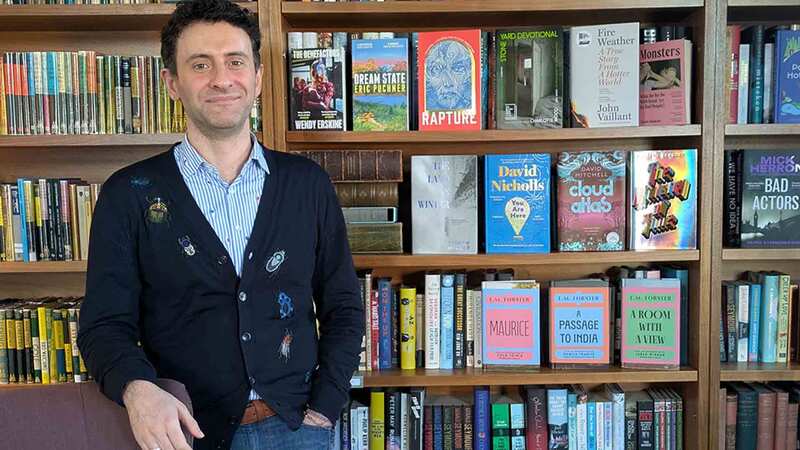You are viewing your 1 free article this month. Login to read more articles.
Média-Participations united
The recent merger between Média-Participations and La Martinière, which has created France’s third-largest publishing group after Hachette Livre and Editis, could have been written in the stars.
The two groups are highly complementary and would have had no overlap if Média-Participations hadn’t taken a majority stake in literary publisher Anne Carrière last June. “We are the leading European publisher of comic books and are strong in children’s, religious and practical books as well, while La Martinière built its business first in coffee-table books and then in literary fiction,” the soft-spoken Média- Participations chairman and c.e.o. Vincent Montagne told The Bookseller, interviewed in his new office in north-east Paris. “We have grown in parallel over the past 20 years.”
The two do not compete in distribution either, he pointed out. La Martinière sold distributor Volumen-Logibris to Editis’ subsidiary Interforum in 2015, leaving the way clear for Média-Participations’ subsidiary, MDS, to take care of distribution for the whole of the new group when current contracts end. The expectation at the time was for Editis to swallow the rest of La Martinière, but that idea went nowhere.
The latest deal was first mooted over lunch between Montagne and La Martinière chief Hervé de la Martinière at the beginning of 2017. The two announced they were entering into exclusive negotiations on an exchange of shares in September, and the groups officially became one on 22nd December.
Although technically a merger, the different size of the groups makes it slightly lopsided. The local subsidiary of the Belgium-based Média-Participations is ranked fifth and La Martinière seventh in France, according to the table published by Livres Hebdo in June 2017. So it was logical that Montagne would head the new entity and de La Martinière, who founded his group in 1991, would be his deputy. It is also logical for the latter to occupy the two empty floors of the former’s new offices in north-east Paris; it would otherwise have been rented out. The move will probably take place at the beginning of 2019.
Together, the groups notched up sales of €558m in 2017, up from what would have been €551m in 2016 if the merger had already been in place (€345m for Média-Participations, €206m for La Martinière). No other figures are available for 2017, as the accounts of the two are now being melded.
But Média-Participations’ net profit of €15m in 2016 is a far cry from 1991, when the group reported losses of the equivalent of €12m on a turnover of €72m after acquiring seven deficit-ridden publishers, including the flagship Dargaud. They are all profitable now.
Montagne has no intention of changing the group’s name. “Média-Participations is neutral,” he says. “Most people have never heard of it, which suits me fine.” But people have heard of the two groups’ leading houses—the literary publisher Le Seuil, which La Martinière acquired in 2004, comic book publishers Dargaud
and Dupuis, and the children’s, practical and religious book house Fleurus. Going even further, few members of the general public would be able to say who created and publishes Blake & Mortimer, one of Média-Participations’ leading comic book series, featuring British scientist Philip Mortimer and his friend Captain Francis Blake of MI5. It is now published by a subsidiary bearing the characters’ names, and “is a case of the hero overtaking the creator”, notes Montagne. This is, however, a phenomenon more or less specific to comic books, which for Média-Participations also include well-known characters such as billionaire’s son Largo Winch and gunslinger Lucky Luke.
Books represent 75% of the new combined group’s sales. Print press (Média Participations’ specialist publications) represents 10%, and audiovisual rights, electronic games and derivatives 15%. The film and TV sector is growing particularly fast. “Producers have options on more than 70 of our books,” says Montagne. “This compares with 60 in 2017, which was an exceptional year.” France is stronger than most other European countries in audiovisual rights sales, he claims. This is partly due to producer-publisher sessions held at the Paris Book Fair (Salon du Livre de Paris) in March, the Shoot the Book! portal and one-on-one sessions at the Cannes Film Festival, and France’s post-war efforts to build its film industry, he explains.
Together, alone
The pinnacle of the new group’s structure is the Belgian-based holding company Média-Participations in Brussels, the successor of the company founded by Vincent’s father Rémy in 1986. La Martinière as a corporate name has been subsumed into the French subsidiary Média-Participations, but remains in the line-up of publishing houses. “We will not merge any of the houses,” Montagne says. “They will all keep their identities and their organisational, operational and strategic autonomy.”
The central management will merely provide the tools for them to conduct their business; its leitmotif is “international”, whether it means selling translation rights, buying existing publishers or creating subsidiaries. Until the merger, only 10% of Média-Participations’ business was outside France and Belgium, but with Abrams in the US, which La Martinière acquired in 1997, it now stands at 25%.
Abrams, which publishes Jeff Kinney’s global-hit series Diary of a Wimpy Kid, will spearhead the group’s expansion in the English-speaking world. But this does not necessarily make sense for other countries, says Montagne. “We have had 180 children’s and teenage titles from our Fleurus catalogue on the market in [South] Korea, and had thought of buying a publisher to take over this business. But we decided in the end to continue selling rights and keep the operation simple and straightforward,” he adds.
China is another story. Média-Participations created a subsidiary in Shanghai in 2008, which is called Dargaud Shanghai—apparently the word Dargaud rings well in Mandarin. On 5th March, Montagne planted a tree of prosperity when the foundations were laid for its theme park centred on Spirou—a Dargaud comic book character pictured—in Shanghai. This will follow the first Spirou park in Monteux, near Avignon, which will open at the beginning of June.
Montagne does not rule out further acquisitions if the opportunity arises. “We have no debt, because the merger with La Martinière was carried out exclusively through the exchange of shares between the two groups,” he says. “But I am not in a race against other groups, and I don’t run after everything that moves.”
Nonetheless, Montagne has been geared up for major external growth for years. He bid for Editis in 2003, but the European Commission rejected all offers because the seller, the Lagardère Group, was out of line with European anti-trust rules. He bid again for Editis when the private investment firm Wendel put the group up for sale in 2008. But his hopes were dashed when it became clear that Wendel was already well advanced in its negotiations to sell the group to Planeta of Spain. He stayed out of the running for Flammarion, which went to Gallimard in 2012, and thought briefly about bidding for textbook house Belin in 2015. But he decided against going any further, with the result that Belin merged with Presses Universitaires de France (PUF) in 2016, and textbooks remain one of the few book sectors outside Média-Participations’ portfolio.
Montagne is determined to help African Francophone authors join the ranks of mainstream French authors to ensure more of them can live off their writing. This is helped by the fact that African-born authors, such as Alain Mabanckou and Gaël Faye have won prestigious French literary prizes, notes Montagne. Mabanckou won four prizes for his Memoires d’un Porc-epic (Memoirs of a Porcupine), which was published by Seuil in 2006, and four for Verre Cassé (Broken Glass), published by Seuil in 2005. Faye won seven prizes for Petit Pays (Small Country), which was published by Grasset in 2016.
A presidential role
As for blending the two corporate cultures, which experts claim can be as tricky as a new marriage, Montagne says he will “start by listening”. Perhaps it is this capacity to listen that has helped him through six years as president of the French publishers’ association Syndicat National de l’Edition (SNE). Trade sources say
it is almost certain that he will be elected for a fourth two-year term in June.
“The general consensus in the book industry is that Vincent Montagne is doing a good job at the SNE,” says Ronald Blunden, a senior vice-president of Hachette Livre and a vice-president of the SNE’s committee for environmental issues. “This has been especially true since Pierre Dutilleul took over as director two years ago. The two have apparently forged an effective work relationship, with Montagne doing the networking and the lobbying, and Dutilleul handling day-to-day operations and troubleshooting. The result is an SNE that runs smoothly”, adds Blunden.
As president of the SNE, Montagne spent a week in India in March as a member of the official delegation for French president Emmanuel Macron’s state visit.
Part of the reason was to meet the bosses of the country’s 10 largest publishers and discuss India’s presence as the Guest of Honour at Livre Paris, in 2020. This was the first time an SNE chief has accompanied a French president abroad since Montagne’s predecessor, Serge Eyrolles, visited China with Jacques Chirac in 1997. “Indian publishers want to establish closer links with French houses, and those of other nationalities, to make up for any problems with the UK because of Brexit,” Montagne notes.













